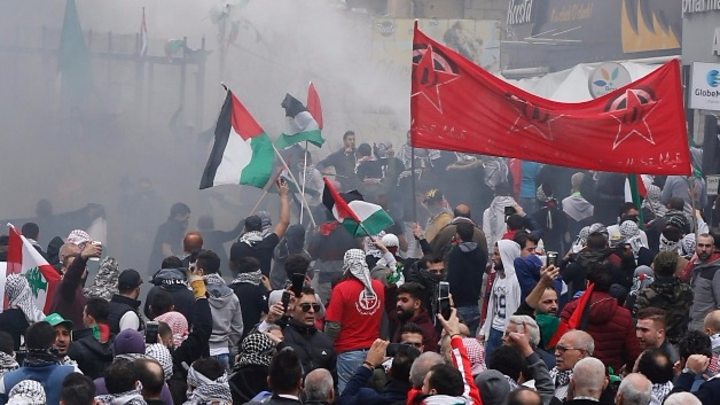
There have been violent clashes near the US embassy in Lebanon, in the latest protest against President Donald Trump’s decision to recognise Jerusalem as the capital of Israel.
Security forces fired tear gas and water cannon to force back flag-waving protesters close to the embassy complex north of the capital, Beirut.
Overnight the Arab League condemned the US decision.
It said the US could not now be relied upon as a broker of Middle East peace.
The protesters threw stones and set fires in the street close to the embassy in the Awkar district.
The security forces had barricaded the main road leading to the large complex.
- Frank Gardner: Counter-terror efforts at risk?
Local media reported that some protesters had tried to break through the entrance to the compound, climbing barbed wire.
The demonstrators, many wearing black and white scarves, chanted slogans denouncing Mr Trump.
Lebanon Communist Party leader, Hanna Gharib, told the protesters the US was “the enemy of Palestine”.
One group set an effigy of the US president alight.
- How the world reacted to Trump move
- What are the alternatives to a two-state solution?
Lebanon is home to hundreds of thousands of Palestinian refugees, including those who fled Israel after it was founded, and their descendants.
In other developments:
- Thousands of people demonstrated outside the US embassy in the Indonesian capital, Jakarta, some waving banners reading “Palestine is in our hearts”
- A burning object was thrown at a synagogue in the Swedish city of Gothenburg late on Saturday in what police said was a failed arson attempt. Jewish community leader Allan Stutzinsky said recent events had led to “higher threats”
- Israel’s PM Benjamin Netanyahu will be in Paris on Sunday for talks with President Emmanuel Macron, ahead of meetings with EU foreign ministers on Monday
There have been three days of protests by Palestinians and their supporters since Mr Trump’s announcement, both in the region and in nations further afield.
Israel has always regarded Jerusalem as its capital, while the Palestinians claim East Jerusalem – occupied by Israel in the 1967 war – as the capital of a future Palestinian state.
Mr Trump has said his decision fulfils a campaign promise and that it is “nothing more or less than a recognition of reality”.
The Arab League resolution came overnight after hours of talks in Cairo. It was backed by a number of US allies, including the United Arab Emirates, Saudi Arabia and Jordan, who had already voiced their concern.
The resolution said:
- The US had “withdrawn itself as a sponsor and broker” of any possible Israeli-Palestinian peace process through its decision
- Mr Trump’s move “deepens tension, ignites anger and threatens to plunge the region into more violence and chaos”
- A request would be made for the UN Security Council to condemn the move
Why Jerusalem is so important
Jerusalem is of huge importance to both Israel and the Palestinians. It contains sites sacred to the three major monotheistic faiths – Judaism, Islam and Christianity.
Israel occupied the eastern sector – previously occupied by Jordan – in 1967, and annexed it in 1980, but the move has never been recognised internationally.
Some 330,000 Palestinians live in East Jerusalem, along with about 200,000 Israeli Jews in a dozen settlements there. The settlements are considered illegal under international law, though Israel does not regard them as settlements but legitimate neighbourhoods.
According to the 1993 Israel-Palestinian peace accords, the final status of Jerusalem is meant to be discussed in the latter stages of peace talks.
The last round of talks between Israel and the Palestinians broke down in 2014 and while the US is formulating fresh proposals, Palestinian officials have said Mr Trump’s announcement has disqualified the US from brokering future negotiations.
